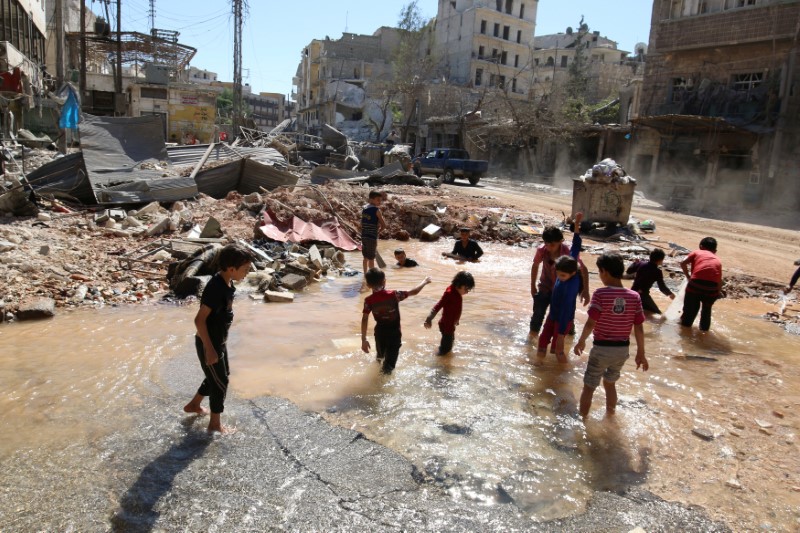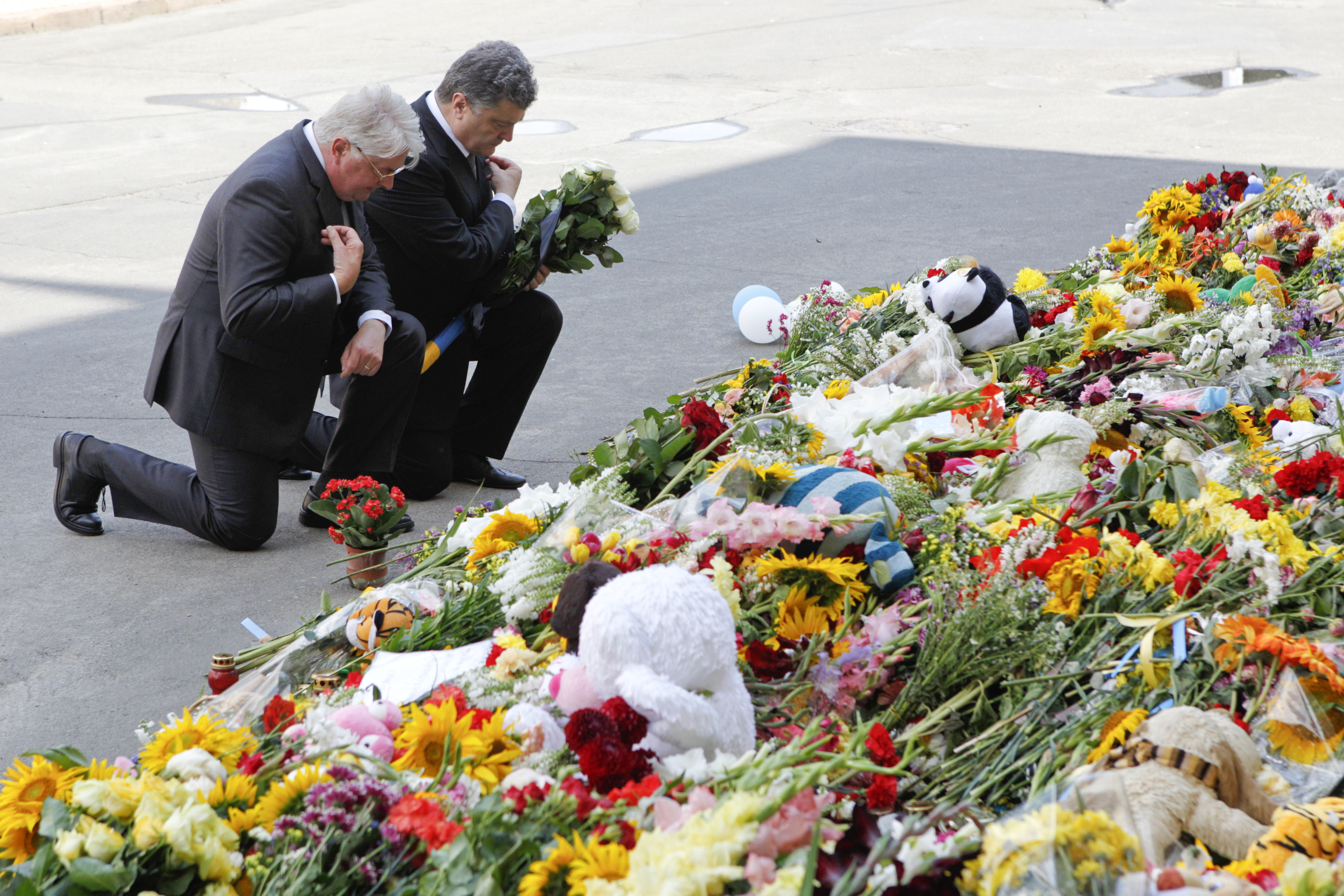
By Ellen Francis and Tom Perry
BEIRUT (Reuters) – Russian or Syrian warplanes knocked two hospitals out of service in the besieged rebel sector of Aleppo on Wednesday and ground forces intensified an assault in a battle which the United Nations said had made the city worse than a slaughterhouse.
Two patients died in one of the hospitals and other shelling killed six residents queuing for bread under a siege that has trapped 250,000 people with food running out.
The week-old assault, which could herald a turning point in the war, has already killed hundreds of people, with bunker-busting bombs bringing down buildings on residents huddled inside. Only about 30 doctors are believed to be left inside the besieged zone, coping with hundreds of wounded a day.
“The warplane flew over us and directly started dropping its missiles … at around 4 a.m.,” Mohammad Abu Rajab, a radiologist at the M10 hospital, the largest trauma hospital in the city’s rebel-held sector, told Reuters.
“Rubble fell in on the patients in the intensive care unit.”
M10 hospital workers said oxygen and power generators were destroyed and patients were transferred to another hospital.
Photographs sent to Reuters by a hospital worker at the facility showed damaged storage tanks, a rubble strewn area, and the collapsed roof of what he said was a power facility.
There were no initial reports of casualties there, but medical charity Médecins Sans Frontières (MSF) said two patients had been killed at the other hospital, in shelling which took it out of service as well, leaving east Aleppo with only seven doctors in a position to undertake surgery.
“And this comes at a time when east Aleppo has been under siege since July and is suffering the bloodiest indiscriminate bombing since the beginning of the war,” MSF’s Syria head Carlos Francisco said.
The government of President Bashar al-Assad, backed by Russian air power, Iranian ground forces and Shi’ite militia fighters from Iran, Iraq and Lebanon, has launched a massive assault to crush the rebels’ last major urban stronghold.
Syria’s largest city before the war, Aleppo has been divided for years between government and rebel zones, and would be the biggest strategic prize of the war for Assad and his allies.
Taking full control of the city would restore near full government rule over the most important cities of western Syria, where nearly all of the population lived before the start of a conflict that has since made half of Syrians homeless, caused a refugee crisis and contributed to the rise of Islamic State.
UNPRECEDENTED BOMBING
The offensive began with unprecedentedly fierce bombing last week, followed by a ground campaign this week, burying a ceasefire that had been the culmination of months of diplomacy between Washington and Moscow.
Washington says Moscow and Damascus are guilty of war crimes for targeting civilians, hospitals, rescue workers and aid deliveries, to break the will of residents and force them to surrender. Syria and Russia say they target only militants.
Asked by a reporter at the United Nations whether Syria had bombed the two hospitals hit on Wednesday, the Syrian ambassador to the world body, Bashar Ja’afari, appeared to laugh.
The Syrian army said a Nusra Front position had been destroyed in Aleppo’s old quarter, and other militant-held areas targeted in “concentrated air strikes” near the city.
U.N. Secretary-General Ban Ki-moon said those using “ever more destructive weapons” were committing war crimes. Describing the situation in Aleppo, he said: “This is worse. Even a slaughterhouse is more humane.”
France’s Foreign Minister Jean-Marc Ayrault said he was working to put forward a United Nations Security Council resolution to impose a ceasefire in Aleppo, and that any country that opposed it would be deemed complicit in war crimes.
“This resolution will leave everyone facing their responsibilities: those who don’t vote it, risk being held responsible for complicity in war crimes,” he said.
Another hospital, M2, was damaged by bombardment in the al-Maadi district, where at least six people were killed while queuing for bread at a nearby bakery, according to the Syrian Observatory for Human Rights monitoring body and residents.
Food supplies are scarce in the besieged area, and those trapped inside often line up before dawn for food.
The collapse of the peace process leaves U.S. policy on Syria in tatters and is a personal blow to Secretary of State John Kerry, who led talks with Moscow despite scepticism from other top officials in President Barack Obama’s administration.
Kerry spoke to Lavrov on Wednesday and Russia said later that it was ready to continue diplomacy on Syria and would soon send experts to Geneva for talks with U.S. counterparts on normalizing the situation in Aleppo and elsewhere.
The U.S. State Department said non-diplomatic options to halt the violence had been discussed within the administration, but declined to say what the options might be.
BATTLEFIELD VICTORY
Assad’s Iranian and Lebanese Hezbollah allies have said in recent days the war will be won in combat.
But the rebels remain a potent military force even as they have lost control of urban areas. The collapse of peace efforts ends a proposed scheme to separate Western-backed fighters from hardened jihadists.
It has also raised the question of whether the rebels’ foreign backers, states including Saudi Arabia, Turkey and the United States, will increase military backing to rebels who have long said weapons they provide are inadequate.
The rebels’ main demand has long been for the provision of anti-aircraft missiles, but Washington has resisted this, fearing they could end up in the hands of jihadists.
U.S. officials told Reuters in Washington that the collapse of the Syrian ceasefire had heightened the possibility that Gulf states, particularly Saudi Arabia, might arm rebels with shoulder-fired anti-aircraft missiles.
A senior rebel commander, speaking on condition of anonymity, said it was not out of the question that this could happen. “The Americans might thinking about doing something, but nobody knows how big it will be,” the commander said.
Another rebel commander told Reuters his group had received deliveries of a new type of Grad surface-to-surface rockets. The rockets, with a range of 22-40 km, had arrived in “excellent quantities” and will be used on battlefronts in Aleppo, Hama and the coastal region, Colonel Fares al-Bayoush said.
Fierce fighting accompanied by air strikes was reported on Wednesday in northern Hama province between Syrian government and allied forces trying to recapture territory lost to insurgents this week, and rebels who made some advances, the Observatory and a rebel group said.
MORE GROUND ATTACKS
A senior official in Aleppo-based rebel group said pro-government forces were mobilizing in apparent preparation for more ground attacks in central areas of the city.
“There have been clashes in al-Suweiqa from 5 a.m. until now. The army advanced a little bit, and the guys are now repelling it, God willing,” a fighter in the rebel Levant Front group said in a recording sent to Reuters, referring to an area in the city center where there was also fighting on Tuesday.
Another rebel official said government forces were also attacking the insurgent-held Handarat refugee camp a few kilometers to the north of Aleppo.
“It doesn’t seem that their operation in the old city is the primary operation, it seems like a diversionary one so that the regime consumes the people on that front and advances in the camp,” the official, Zakaria Malahifij, head of the political office of the Fastaqim group, told Reuters from Turkey.
(Reporting by Tom Perry, Ellen Francis and Lisa Barrington in Beirut, Philip Pullella in Vatican City, John Irish in Paris and Stephanie Nebehay in Geneva, Lidia Kelly in Moscow, Michelle Nichols in New York and Arshad Mohammed in Washington, writing by Peter Graff, editing by Peter Millership and Philippa Fletcher)











